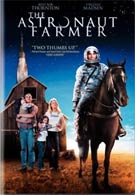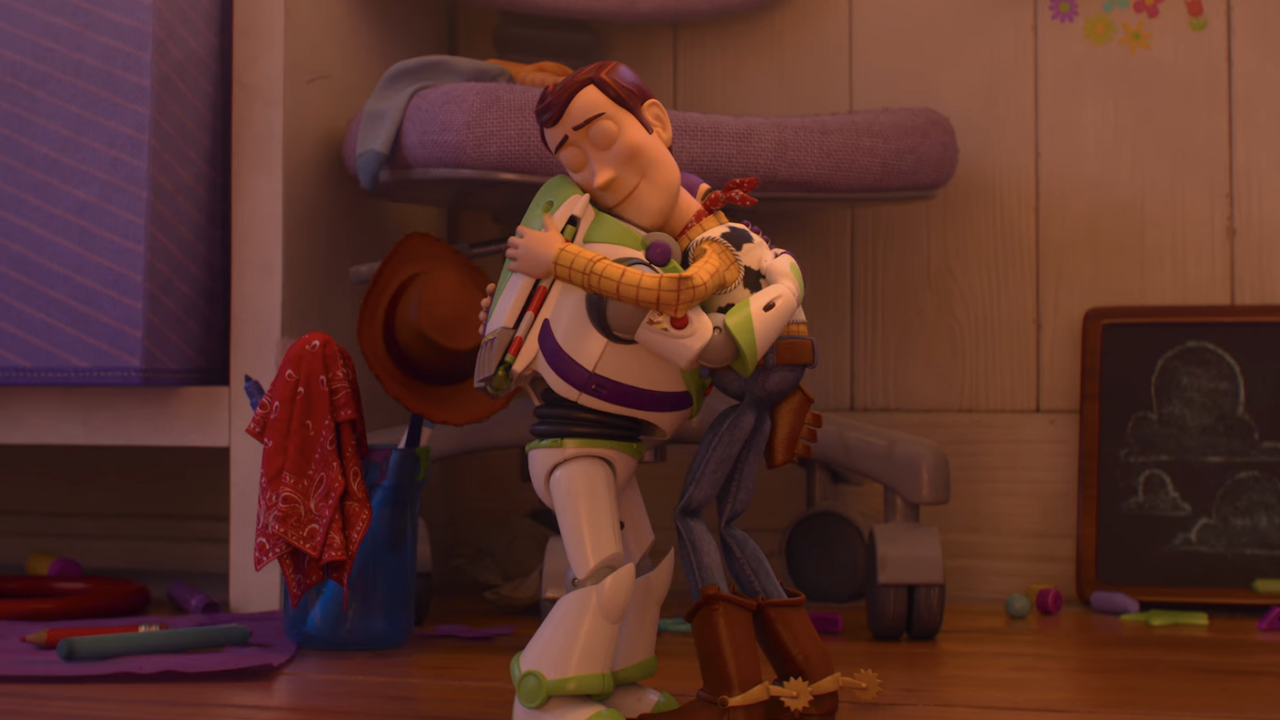I love movies about chasing dreams. As someone who has put life on hold to chase a few of my own, I’m all about encouraging people to believe in what could be, and reach for the stars, and all of those overused clichés. My only problem is when stories take the idea of chasing dreams and put it above other things that are important – such as the stability of a family or the welfare of children. Unfortunately, the idea of a farmer and father risking everything to become an astronaut falls straight into that category, damaging what was already a ridiculously sappy movie to the point that I can’t feel comfortable recommending it. That’s a shame, because as sappy as it might be, there is some enjoyment in The Astronaut Farmer. You have to give the movie credit - The Astronaut Farmer delivers exactly what the title promises. A farmer (named Farmer actually – Charlie Farmer) strives to become an astronaut. His dream to go into space is so strong that he’s taken out multiple mortgages on his house, is hundreds of thousands of dollars in debt, and he has the town gambling over whether he won’t launch or will blow himself up (nobody actually wagers on Charlie making it). For all his debt, he has one hell of a rocket in his barn, just awaiting the final touches and fuel for a lift-off that will take Charlie into space.
From the moment we first see Charlie, his dream is clear. He is out on his ranch, chasing a stray calf, but performing the task in his space suit. The movie starts with the rocket near completion, not setting up a how or why for Charlie’s dream; just that it is. Rather than set things up from the start, Charlie’s past as a former aeronautical engineer and aircraft pilot is revealed, as well as a troubled relationship with his own father. As the story piles obstacles against Charlie, including FBI intervention (a common reaction to anyone ordering 10,000 pounds of rocket fuel), foreclosure on his farm, and even tests of his sanity, the would-be-astronaut stays focused on his dream, pulling his children from school to better help as his flight team and surrounding his home with reporters in an effort to win over the public and keep the FBI at bay. We know from the moment we first see the character his dream, and so we know the movie can only end one of two ways – he flies, or he doesn’t. Through all of this dream-chasing, however, I couldn’t help but wonder – what about the children?
As admirable as it is for Charlie Farmer to unite his family toward a common dream (his father-in-law, played by Bruce Dern, points out he couldn’t even get his family together for dinner, let alone following a dream), the movie doesn’t take time to look at how this is affecting the younger members of the Farmer family. Presumably the younger girls are too young to really be affected too drastically by events and, given the quality of the rocket, this has been going on for some time, so the family is just used to it. But removing the children from school and putting the entire family in financial straits seems irresponsible for a character the story is trying to sell as a strong father figure, especially a figure that’s being placed in contrast with his own, less-successful father.
In fact, the only impact the dream of space seems to have on the family is when Charlie’s wife, Audey (Virginia Madsen), discovers just how in debt the family is – something the farmer never told her, despite the pending foreclosure. The scene is one of Madsen’s few chances to shine in the movie and she makes good use of it. The fact that it stands out because she makes good use of it says something about the rest of the movie: it’s bland. Once Audey gets the initial reaction to the debt worked out, she’s back to being the supportive wife. Meanwhile, Billy Bob Thornton’s performance of Charlie is more subdued than most of his roles, and subdued isn’t Thornton’s best style. We like to see him active, threatening people (which, admittedly, he does a few times in here) or freaking out about things. A tame Thorton just isn’t interesting.
The overall story for the film is about the strength of one family uniting together to follow one dream. The movie presents this strength of family as its main theme, and, as an audience, we are supposed to rally behind the Farmers as they sacrifice and pull together to send Charlie into space. Pass or fail, the family that dreams together is a strong one. It’s a sappy message that the film works hard to deliver. Unfortunately, I just can’t help but feel this family wasn’t as united as they thought, and in more jeopardy than most of them knew, detracting from the message of family unity.
The Astronaut Farmer isn’t a complete wash. Some of the cinematography is quite excellent, and the director uses voiceovers incredibly effectively to help the movie moving along, bridging scenes and sequences for less time taken up in transition. Overall, the concept of the movie is presented well enough that it will pull a few tears from viewers in its sappier moments, but the theme rapidly falls apart after the credits have rolled and any time is spent thinking about the movie. I can suggest The Astronaut Farmer as an enjoyable watch, but don’t try to analyze it too much after you’re done, or you might wind up liking it less than you thought you did. The DVD release for The Astronaut Farmer is a bit of a throwback as far as DVDs go, reminiscent of older DVD releases instead of a brand new disc. It seems Warner Brothers is really aiming for the family audience, making this disc as user friendly as possible, but giving very little in the way of added material.
What do I mean by saying this is reminiscent of an older DVD? Well, for starters, this is a flipper disc, with widescreen on one side and full frame presentation on the other. I can’t recall the last time I saw that from a new release. With High Definition becoming more common, full frame is starting to disappear, or the two options are offered separately. This is what I mean by making the DVD as user friendly as possible. Buy one disc, get whatever version of the movie you want. It struck me as odd when I opened the package just because I haven’t seen it in a while, but it’s a welcome return to that packaging concept.
Your Daily Blend of Entertainment News
There is only one featurette included, titled “How to Build a Rocket: The Making of The Astronaut Farmer. For a “making-of” documentary, the featurette spends very little time talking about how the movie was made. Instead the cast and crew talk about how enjoyable it was to work with the Polish Brothers who wrote and directed the movie (with one of them appearing in the film on screen). The Brothers emphasize the theme of family unity and show how their own families grew stronger making this movie, as their daughters play the young girls in the movie. Segments of the featurette are divided by some touching and memorable quotes by real astronauts for a nice added touch.
The only other extras on the disc are a three-minute interview with astronaut David Scott about his take on the movie (how unlikely the story is but how neat it is at the same time) and a blooper/outtake reel. Seeing Thorton’s outtakes from other movies, I must say I’m surprised at how well behaved he was when he’d fumble, although the humor does get a little bawdy for a PG movie. Still, no outtake reel is complete without the appearance of Thorton’s Slingblade character, and the actor doesn’t disappoint here.
I was a little disappointed at the lack of a commentary track on the disc, particularly when “How to Build a Rocket” focuses so much on how the Brothers work. It would have been nice to see the Polish Brothers speak for themselves about their movie a little bit. Sadly that, like most other extras we’d expect to see, isn’t here. Pick this DVD up for the movie itself, but don’t expect much else from this release.

